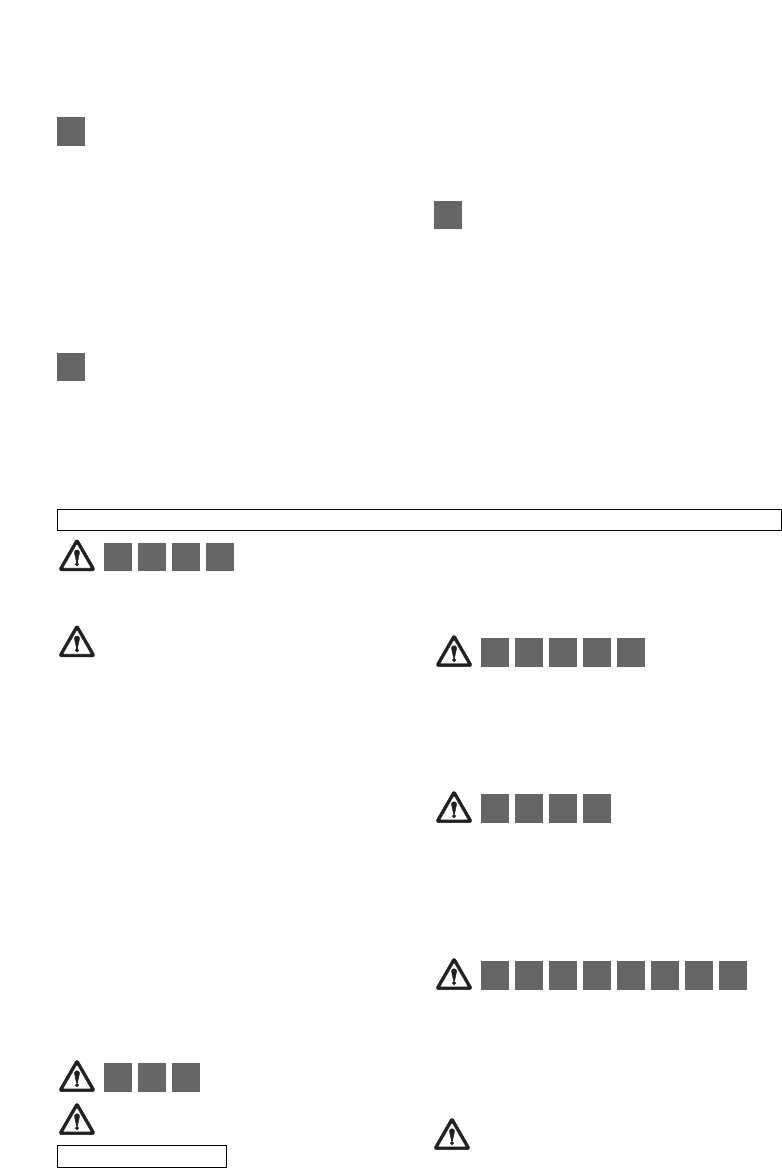
Safety lever
Never use the machine with its Safety lever
pressed with adhesive tape, string or other.
This device serves to prevent accidentally press-
ing the throttle trigger (fig. A no. 3). In fact, the
trigger (fig. A no. 3), can only be pressed if the
safety lever is pressed at the same time (fig. A no.
17). By means of 2 separate springs, upon
releasing the grip, the throttle trigger (fig. A no. 3)
and safety lever (fig. A no. 17) return automatically
to their original positions.
Antivibration device
The machine is equipped with an antivibration
device which serves to reduce the vibrations
transmitted to the operator.
Engine stop device
Turn the stop button Stop (fig. A no. 7) to O /
STOP to stop the engine. To make sure this but-
ton works properly, start the engine and check
that it stops when the Stop button is turned to
the Stop position.
Protection for transport
Never use a machine with the blade cover
still on.
The guard covers the sharp extremities of the
blade when the machine is in the resting position
for transport or storage.
Safety guard
This very important safety device (fig. A no.19)
prevents any objects that come into contact with
the cutting device, or the grass itself, from flying
up and striking the operator.
Safety pole guard
This device, fastened to the machine, ensures a
minimum distance between the operator and the
cutting device during use, and prevents the
machine from striking and injuring the operator if
the blade hits a hard surface (fig. A no. 18).
Muffler
The muffler serves to reduce the noise level to a
minimum and to route the exhaust fumes pro-
duced by the combustion engine away from the
operator.
Harness
CAUTION! It is very important to famil-
iarize yourself with the release mecha-
C. Description of the safety devices on the machine
1 2 3 4
4 10 13
1 2 3 4 10
1 2 3 4
1 2 3 4 6
ENGLISH - 4
recommend emptying the fuel tank whenever you
transport the machine.
Fire prevention precautions
Never work with the brush cutter in the presence of
fire or spilled gasoline. If you have spilt it on yourself,
change your clothes at once. Keep the machine clean by
removing any grass cuttings, leaves, excess oil to reduce
the fire hazard. Engine exhaust fumes can get very hot
and may contain sparks. Do not use the machine near
inflammable material. The muffler gets very hot during use
and remains hot for some time after switching off the
engine. This also applies at idle speed. Take every precau-
tion to reduce the fire hazard, especially in the presence of
inflammable materials or gas. Start the engine at a dis-
tance from the filling site and far away from any fuel tanks
(at least 3 meters).
When filling the fuel tank, dry any spilled fuel. Never
add fuel in the tank when the engine is running or
hot to avoid the risk of fire (let the engine cool off before fill-
ing the tank). Fill the tank outdoor, far from flames or
sparks. Do not take the cap off the tank with the engine
running. Open the cap on the tank carefully to eliminate
any excess pressure. After fueling, close the cap tightly.
Take care not to spill any fuel. The fumes produced by the
fuel can cause an explosion or fire. Gasoline is highly
inflammable: before going near any type of fuel, put out
your cigarette, pipe or cigar. Do not smoke or take
sources of heat or sparks near the fuel. Never refuel near
or over inflammable objects (dry leaves, etc..).
Kickback
Machines equipped with blades may produce a
violent kickback on contact with solid bodies. The
force of the kickback can cause the operator to lose con-
trol of the machine. The blade is capable of amputating
arms and legs. Always work with a sharp blade. A blade
with worn teeth can create problems in cutting and can
cause KICKBACK, that is, a violent thrust on the front of
the machine caused by the impact of the blade against
wood or solid foreign bodies. This kickback can cause
loss of control of the machine. Never sharpen a damaged
blade: replace with a new one. Kickback can also occur
when cutting with any type of blade in the hazardous
zone (see I3). Do not let the blade cut in the risk sector to
prevent kickback.
14
15
16
7 9 14















